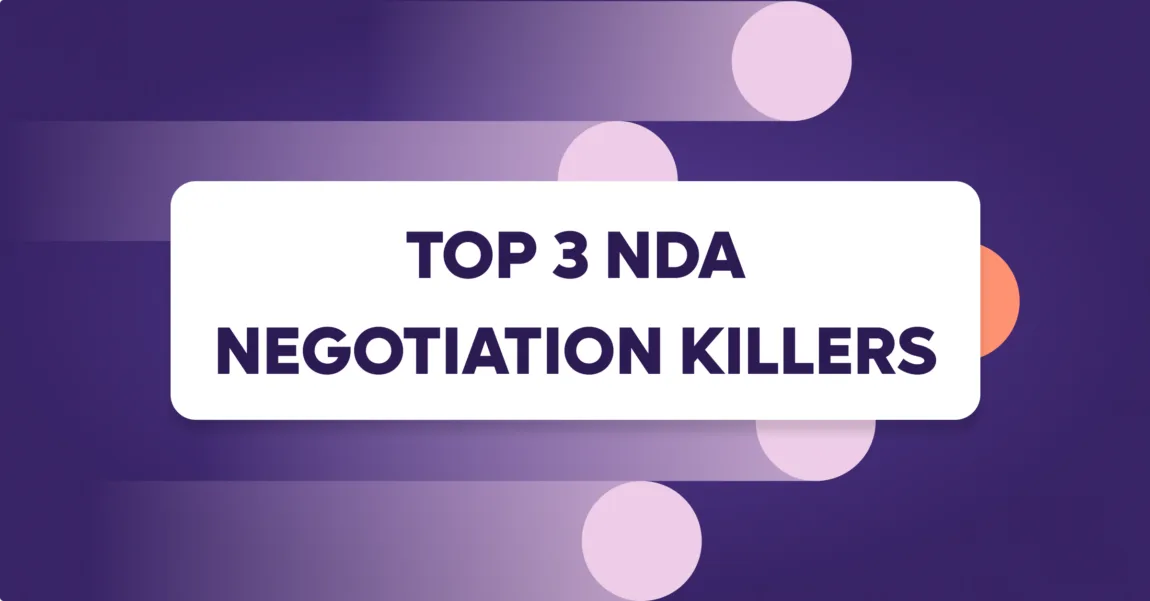Non-Disclosure Agreements (NDAs) are a common resource for protecting sensitive information in business dealings. Whether you’re negotiating a new partnership, working with clients, or simply trying to keep proprietary information secure, NDAs are often part of the process. While the purpose of an NDA is straightforward, the legal fees associated with these agreements can be less clear at times.
For many businesses, especially marketing agencies, sales teams, and even C-level executives, the question of ‘how much does an NDA cost?’ isn’t always easy to answer. These kinds of expenses can vary widely depending on multiple factors, including but not limited to the complexity of the agreement and the method used to draft or review it. Over time, these costs can add up more and more.
However, managing these costs doesn’t have to be overwhelming. As long as you understand the factors that influence NDA expenses and explore practical strategies, you can find ways to keep these costs under control. Whether you’re dealing with NDAs regularly or just occasionally, we’ll break down the components of NDA costs, and offer some straightforward tips for reducing legal fees.
Breaking down your NDA cost
When it comes to non-disclosure agreement expenses, it’s helpful to look at the components that contribute to the overall NDA cost. These costs aren’t one-size-fits-all—they can differ pretty much based on your specific business needs and the approach you take to create or review the agreement.
Legal fees
One of the most significant expenses associated with NDAs is legal fees. If you hire a lawyer to draft or review an NDA, the cost will certainly depend on the firm/attorney’s billing structure.
- Hourly rates. Many attorneys charge by the hour, with rates varying depending on experience, location, and the complexity of the agreement, e.g., an experienced lawyer in a major city might charge upwards of $400 per hour, while rates in smaller markets could be lower.
- Flat fees. Some law firms offer flat fees for drafting or reviewing NDAs. This can be a more predictable option, as you know the total cost upfront. Flat fees range from a few hundred $ to over a thousand, again, depending on the agreement’s complexity and the firm’s pricing structure.
DIY NDA templates
Using a do-it-yourself (DIY) template can be an appealing alternative. You can find these templates available online for a fraction of the cost of hiring a lawyer, with some even being free. Yes, free.
But, you know the old saying ‘you get what you pay for’ often applies here. While a DIY template might work for very basic agreements, there are risks involved. If the template isn’t tailored to your specific needs, it might leave out critical clauses or include language that doesn’t fully protect your interests. This could lead to costly legal disputes down the line, negating any savings from using a template.
AI-powered contract review
We’ve seen a growing number of C-suite execs, salespeople, and marketing agencies turning to AI contract review software as a cost-effective option to traditional contract review costs. These tools can analyze contracts and identify risky clauses faster and cheaper than a large team of human attorneys.
If your business in particular constantly deals with a high volume of NDAs, you could find AI contract review technology helpful to speed up the process and reduce the NDA cost and the need for manual review. Even though an AI contract review tool has the potential to handle many aspects of contract review, it may not replace the nuanced judgment of a seasoned attorney in more complex situations.
Cost of NDA review

Let’s take a closer look at the main factors influencing a typical NDA review cost and some tips.
Complexity of the agreement. The more complex an NDA, the higher the cost to review it. If the agreement involves multiple parties, detailed confidentiality provisions, or specific industry regulations, the review becomes more time-consuming and, therefore, more expensive. Complex agreements, like an indemnity clause in an NDA, often require a thorough examination to cover all potential risks.
Number of revisions required. Non-disclosure agreements (NDAs) often go through multiple rounds of revisions before both parties are satisfied with the terms. Each revision typically requires additional review, which can drive up costs. Keep in mind that if the agreement needs to be tailored to specific situations or if there are endless back-and-forth contract negotiations, expect the legal fees to go up.
Specific clauses requiring expert attention. Certain clauses, such as indemnity provisions, can be somewhat tricky and may demand expert legal attention. These clauses affect the rights and obligations of the parties involved, and any ambiguity may result in disputes. The need for specialized legal expertise to review these clauses doesn’t cut legal costs but instead adds to the overall NDA review cost.
Alternative ways to reduce NDA review cost
One effective way to reduce the cost of NDA reviews that never gets old is to use a checklist before submitting the agreement to a lawyer. These contract review checklists walk you through all the necessary elements to make sure the agreement document is as complete as possible. It’s ideal for catching potential issues early, reducing the number of revisions needed, and saving time and money.
Also, leveraging AI contract review software is another practical way to reduce costs. Advanced AI technology can quickly analyze the NDA, flag potential issues, and suggest revisions, streamlining the review process. Which reduces the need for extensive manual review and can lower the overall cost.
Standardization of NDA review
Creating standardized NDA templates tailored to your business’s common scenarios is another practical way to reduce costs. When you frequently require NDAs, that standard template reduces the time spent on each new agreement. This works for routine agreements, where the basic terms remain consistent.
While you must tailor NDAs for complex situations, standardization allows you to bypass unnecessary legal fees for simpler agreements. You still retain the option to involve a lawyer for unique cases, but with the groundwork already laid, their time (and your money) is used more effectively and efficiently.
Cutting costs through strategic negotiation
During NDA review negotiations, focus on the most critical terms that could impact your business (confidentiality obligations, indemnity clauses, duration). Narrow the scope of the negotiation to the essential points to reach an agreement faster.
Plus, when you enter negotiations with a clear understanding of your priorities, you avoid unnecessary changes that could drive up costs. Watch for NDA negotiation killers can provide you with valuable insights into common pitfalls to avoid.
Making informed decisions to control NDA costs
In the end, controlling NDA costs requires a thoughtful and strategic approach. Whether you’re addressing legal fees, reviewing complex clauses, or negotiating terms, understanding what drives these expenses is key.
Standardizing your processes, leveraging AI contract review software, and focusing on critical terms during negotiations protect business interests and reduce your NDA cost. With careful planning, you can manage the complexities of NDAs, keeping both legal risks and costs in check.





By entering your email, you agree to our Terms & Conditions and Privacy Policy.